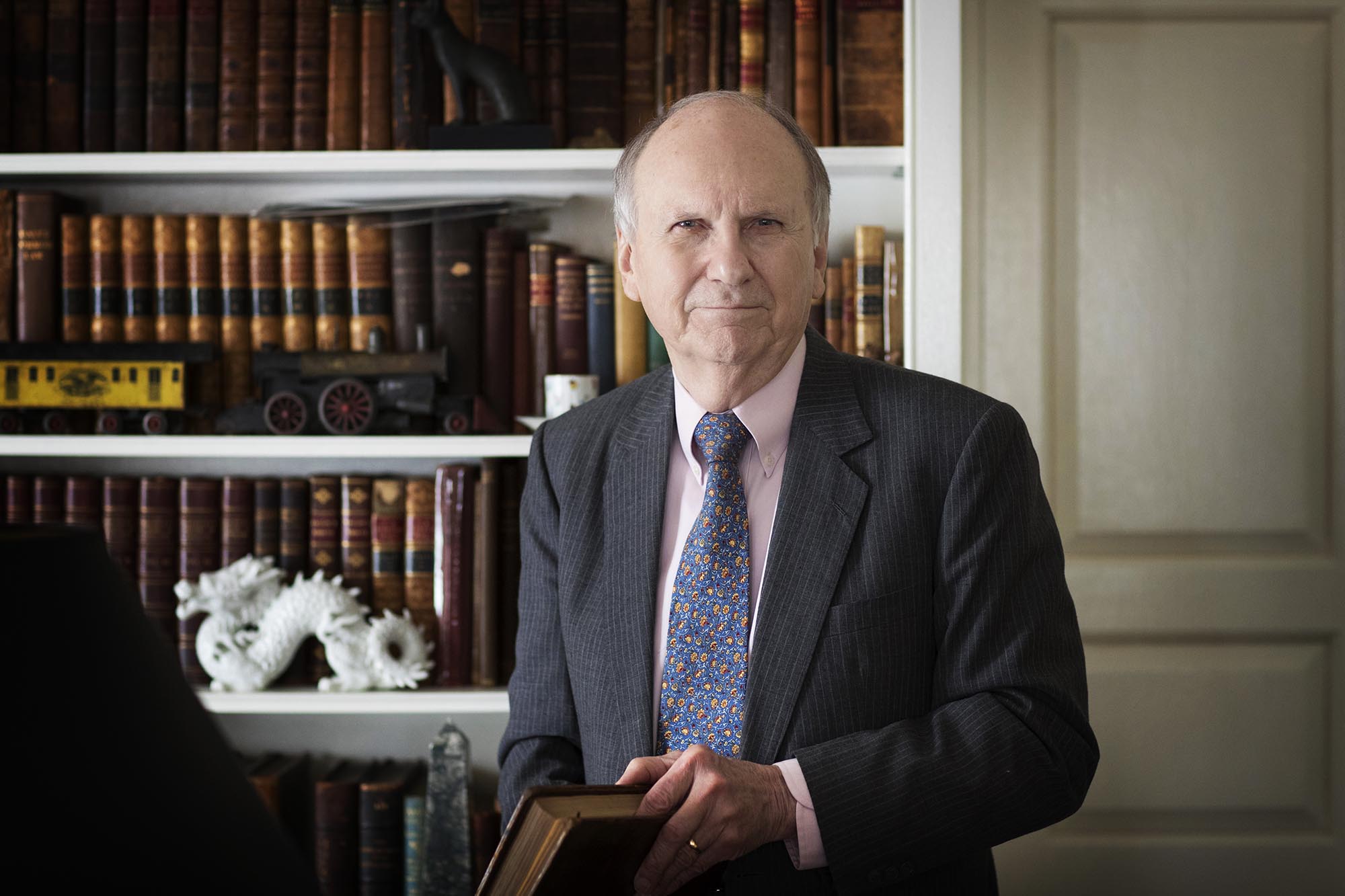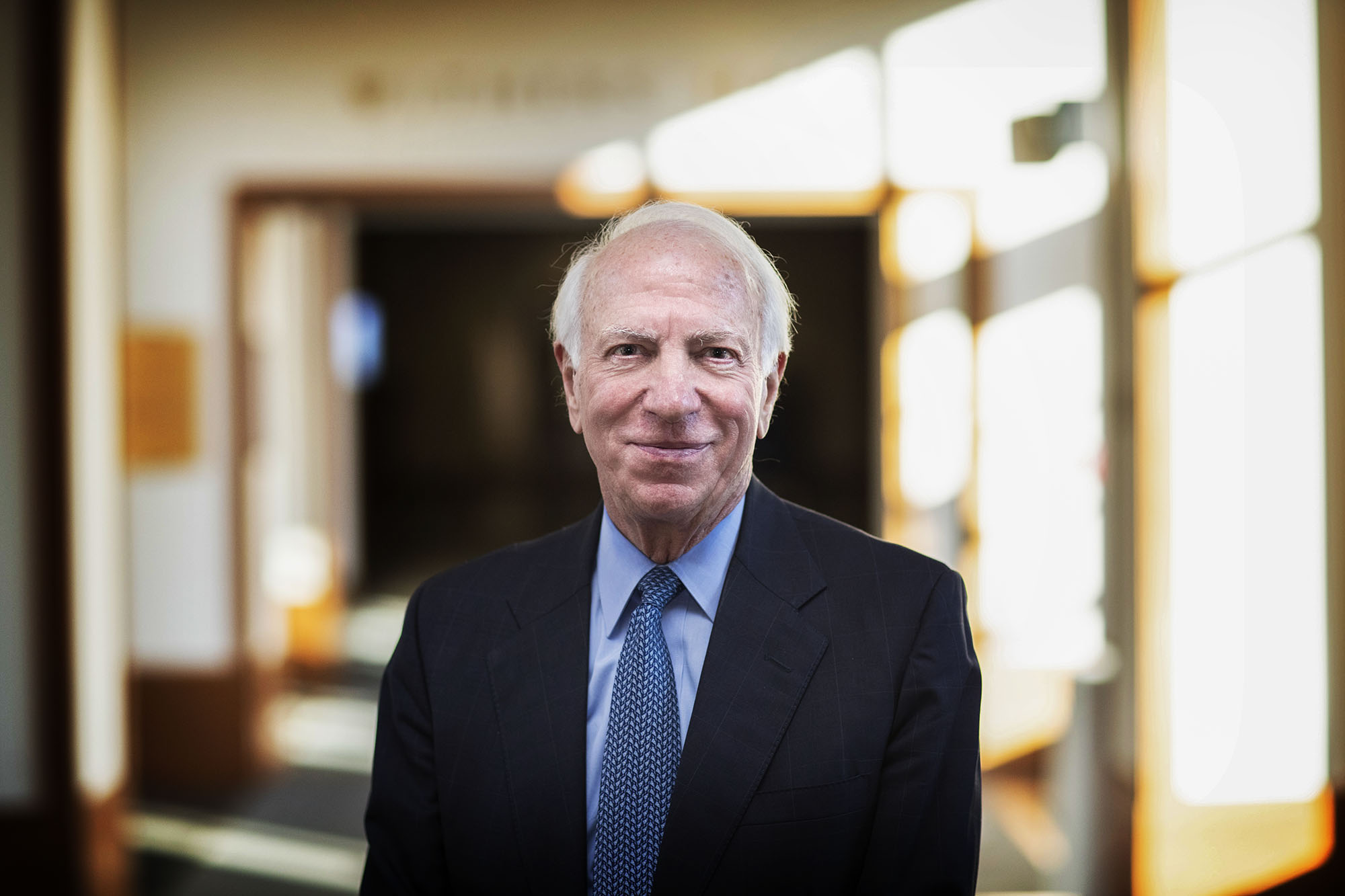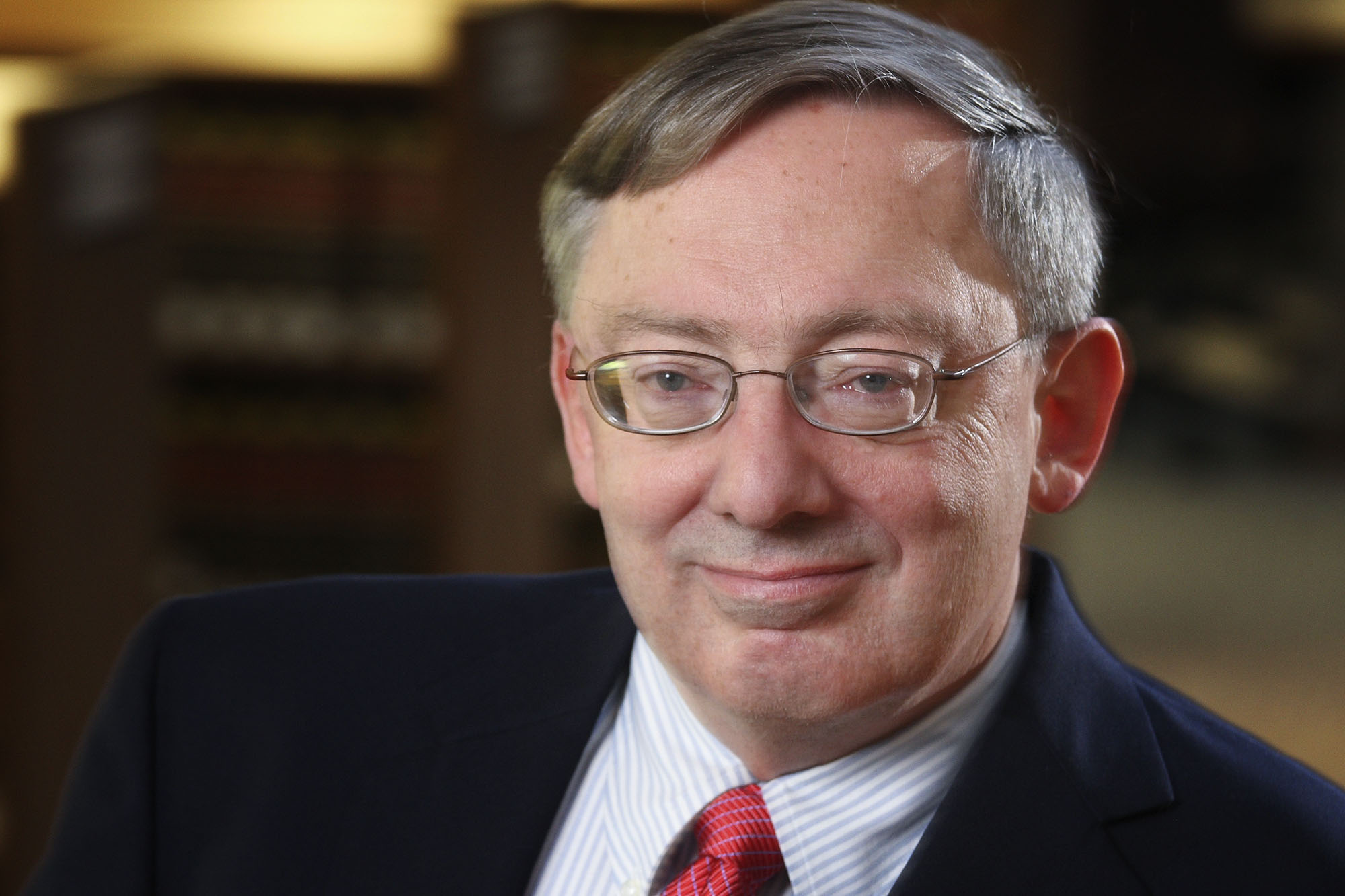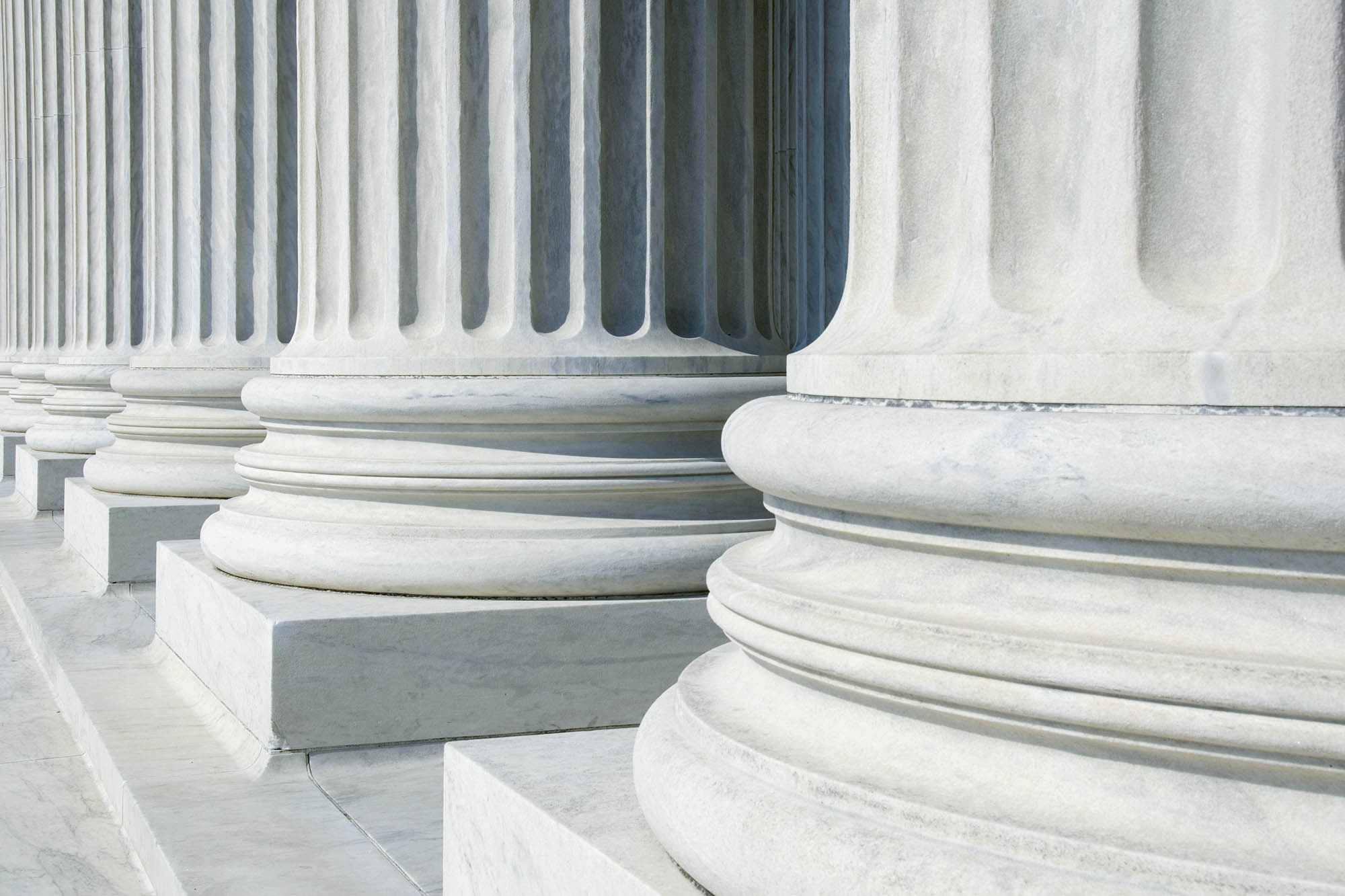The U.S. Supreme Court expanded religious and LGBTQ rights, narrowed presidential power and affirmed abortion rights during its most recent term, which ended Thursday.
University of Virginia School of Law resident faculty were cited in 20 cases: Professors Caleb Nelson with six; Ann Woolhandler with four; John Harrison and G. Edward White with two each; and Aditya Bamzai, John Duffy, John C. Jeffries Jr., Saikrishna Prakash and Frederick Schauer, and UVA President Jim Ryan with one each. Three professors had multiple books or articles cited: Nelson with six, and White and Woolhandler with two each. UVA professor Paul Halliday, who holds joint appointments in the Law School and UVA’s Corcoran Department of History, and visiting professor Neil Duxbury were also cited.
Several Law School faculty members recently discussed some of the justices’ most impactful rulings.
The Roberts Court
Professor A.E. Dick Howard is a widely acknowledged as an expert in the fields of constitutional law, comparative constitutionalism and the Supreme Court.
“People assume that once the two Trump appointees, Gorsuch and Kavanaugh, were seated in the last couple of years that we would now have a pretty safe conservative working majority. Well, that may be true most of the time, but the abortion decision [June 29] reminds you that justices do have independence of judgment.”

Professor A.E. Dick Howard is an expert in the fields of constitutional law, comparative constitutionalism and the Supreme Court. (Photo by Dan Addison, University Communications)
Atlantic Richfield Co. v. Christian
Does federal law take precedence when states want to make alternative cleanup remedies that conflict with Environmental Protection Agency-ordered remedies?
Judgment: The court ruled 7-2 that landowners living on a Montana Superfund site could seek out additional cleanup beyond EPA’s plans – as long as they acquired permission from the agency.
Professor Cale Jaffe, director of the Environmental Law and Community Engagement Clinic, co-wrote an amicus brief in the Atlantic Richfield case.
“If environmental groups or landowners can use state law to force EPA to go above and beyond, the question was, ‘Can industry do the reverse and use state law to prevent EPA from going above and beyond?’ And I think the clear answer from the Supreme Court on that is no, it’s a one-way ratchet. An EPA [Comprehensive Environmental Response, Compensation, and Liability Act, known as Superfund] remedy sets the floor, and state law can’t weaken that.” (Quoted in Law360)
Bostock v. Clayton County
Does Title VII of the Civil Rights Act apply to the LGBTQ community?
Judgment: The court ruled 6-3 that the 1964 Civil Rights Act, which bars sex discrimination in the workplace, also applies to the gay and transgender communities.
Professor Anne Coughlin is an expert in gender and the law, and feminist jurisprudence.
“The ruling is a very big deal. The expressive value is massive, as the court has made clear that LGBTQ rights are civil rights for purposes of Title VII. The decision represents a significant cultural shift in public attitudes about the value, dignity and worth of LGBTQ people. Its significance is underscored by the fact that the opinion was authored by Justice [Neil] Gorsuch and joined by [Chief] Justice [John] Roberts, whom conservatives were counting on to vote the other way. The opinion will have important practical force as well. Before Bostock, it was legal in about half the states for employers to fire or otherwise penalize workers for being gay, transgender or bisexual. After Bostock, Title VII protects workers from that form of discrimination.” (Read the full UVA Today Q&A)
Department of Homeland Security v. Regents of the University of California
Does the executive branch have the authority to end DACA?
Judgment: The court ruled 5-4 that executive branch could not immediately shut down DACA.
Professor Kevin Cope’s scholarly interest is focused mainly on the law and politics of international institutions, migration, and relationships between domestic institutional structure and international behavior.
“The court’s decision is a narrow procedural victory for the approximately 700,000 beneficiaries of the Deferred Action for Childhood Arrivals program. The majority held that, while the Trump administration has the power to terminate the program, the administration’s stated reasons for doing so were inadequate. Specifically, the court determined that the secretary of Homeland Security failed to consider the potential legality of the parts of the program that protect beneficiaries from removal. The Trump administration will now have another chance to rescind the program with a new procedure, but ultimately, the November 2020 election will likely determine DACA’s long-term future.”
Espinoza v. Montana Department of Revenue
Can states exclude religious schools from religiously neutral programs providing funding to students attending private schools?
Judgment: The court ruled 5-4 that states may not refuse to provide aid to religious schools if that aid is also offered to private schools.
Professor Richard Schragger’s scholarship focuses on the intersection of constitutional law and local government law, federalism, urban policy, and the constitutional and economic status of cities. He also writes about law and religion.
“In less than a generation, the court has moved from a position of disallowing aid to religious schools, to permitting it, to now mandating it. That is a sea change in the court’s interpretation of the religion clauses, and it raises many new questions about what the government can require of religious institutions that receive government monies. Those questions will occupy the court for some time to come.”
Hernandez v. Mesa
Can the family of a Mexican citizen killed by a U.S. Border Patrol agent in a cross-border shooting sue in federal court?

Judgment: The court ruled 5-4 that the agent could not be sued.
Professor Douglas Laycock is one of the nation’s leading authorities on the law of remedies. He has argued before the Supreme Court five times and is co-reporter of the American Law Institute’s “Restatement (Third) of Torts: Remedies.”
“The court once again refused to provide any remedy for constitutional violations that could not be anticipated, and get to court only after they already happened. A federal agent shoots a child in cold blood, for no reason, according to allegations that must be taken as true at this stage of the litigation. The family has no remedy, the federal courts cannot do anything about it, and an out-of-control agency is extremely unlikely to do anything about it.”
June Medical Services LLC v. Russo
Is a law requiring physicians who perform abortions to have admitting privileges at a local hospital unconstitutional?
Judgment: The court ruled 5-4 that the Louisiana law was unconstitutional.
Schauer’s expertise in the philosophy of law, legal reasoning, constitutional law, jurisprudence and evidence has been demonstrated in hundreds of books, book chapters, articles, essays, classes and personal appearances.
“Chief Justice Robert’s opinion is important because it is one of the very few opinions in the Supreme Court’s history in which the doctrine of stare decisis led a justice to follow a decision he or she thought was wrongly decided. That is exactly what stare decisis requires, but most references by the Supreme Court to stare decisis involve justices following an earlier decision they believe is correct on the merits, thus making references to stare decisis almost superfluous. Here we have a justice recognizing that stare decisis, if taken seriously, means following decisions one believes to be incorrect. Rarely does this happen, and even more rarely is the effect as clear as it was for the chief justice in this case.”
Professor Lois Shepherd, an expert in the fields of health law and bioethics, teaches at the Law School and the Medical School.
“This decision doesn’t seem terribly surprising. If stare decisis means anything, the court was going to have to strike down the Louisiana admitting privileges statute after Whole Woman’s Health in 2016. The Louisiana and Texas statutes were nearly identical, and the evidence is actually stronger in June Medical that access would be severely burdened by the regulations. Of course, it was a 5-4 decision, revealing that deep divisions continue (and will continue) on the fundamental question of a right to abortion. But Chief Justice Roberts is now an unlikely vote to overturn the abortion right – he’s arguing for a return to the Casey ‘substantial obstacle’ standard as an alternative to Whole Woman’s Health benefits/burdens calculation. Under the Casey standard, abortion can be heavily regulated – but not out of existence.”
Kahler v. Kansas
Do states have the power to abolish the insanity defense?
Judgment: The court ruled 6-3 that due process does not require Kansas to adopt an insanity test that turns on a defendant’s ability to recognize that his crime was morally wrong.
Professor Richard Bonnie, director of the Institute of Law, Psychiatry and Public Policy, has co-written leading textbooks on criminal law and public health law. He is co-author of an amicus brief in Kahler.

Professor Richard Bonnie is the director of the Institute of Law, Psychiatry and Public Policy. (Photo by Dan Addison, University Communications)
“The ‘originalist’ Supreme Court failed to respect what must have been the expectation of our founders. We hope and expect that state legislatures will decline to follow the court’s misguided invitation and will choose instead to preserve the moral integrity of American criminal law.” (Op-ed for The Hill)
Kelly v. U.S.
Did the “Bridgegate” scandal amount to a violation of federal law?
Judgment: The court ruled unanimously that it did not.
Professor Deborah Hellman’s scholarship focuses on the relationship between money and legal rights. This includes articles on campaign finance law, bribery and corruption, each of which explore and challenge the normative foundations of current doctrine.
“In Kelly v. U.S. (the Bridgegate case), Justice Elena Kagan, writing for a unanimous Supreme Court, overturned the conviction of two New Jersey officials for wire fraud and fraud on a federally funded program in connection with lane closures on the George Washington Bridge. The court held that the decision to close the lanes from Fort Lee to punish the Fort Lee mayor for refusing to support the reelection campaign of Gov. Chris Christie did not meet the requirements of the federal statutes because they received no property as a result of the fraud. At the same time, Justice Kagan emphasized that the conduct was both ‘corrupt’ and ‘an abuse of power.’ The case highlights the limits of federal criminal statutes in constraining the corruption of state officials. In addition, and perhaps most importantly, the result underscores that political corruption involves more than a violation of criminal law. This last point is perhaps in tension with the campaign finance holdings of the current court in which the ‘corruption’ that is sufficient to justify restrictions on giving and spending in connection with elections is defined very narrowly.”
Little Sisters of the Poor Saints Peter and Paul Homes v. Pennsylvania
Under the Affordable Care Act, can the executive branch implement rules exempting employers with religious or moral objections from providing contraceptive coverage to their employees?
Judgment: The court ruled 7-2 that the executive branch can allow employers to deny contraception coverage on religious or moral grounds.
Professor Micah Schwartzman, director of the Karsh Center for Law and Democracy, focuses on law and religion, jurisprudence, political philosophy and constitutional law.
“In Little Sisters of the Poor Saints Peter and Paul Homes v. Pennsylvania, the Supreme Court upheld religious and moral exemptions that the Trump administration has granted to both for-profit and nonprofit organizations that object to contraceptive coverage requirements under the Affordable Care Act. In a narrow opinion by Justice [Clarence] Thomas, the majority determined that the administrative agencies responsible for the exemption had statutory authority and followed appropriate procedures in granting them. The court also held that agencies could consider the Religious Freedom Restoration Act in formulating religious exemptions, but the court did not reach the merits of applying RFRA in this case.
“In a sharp and powerful dissent, Justice [Ruth Bader] Ginsburg, joined by Justice [Sonia] Sotomayor, emphasized that our national tradition of religious accommodation has always been balanced by the rights and interests of those burdened by exemptions. In this case, the government granted an expansive and categorical exemption that gave no consideration to the interests of tens of thousands of women, who have now lost their statutory right to contraceptive coverage and to equal treatment in the provision of preventive care.
“As the dissenters argued, this result is neither mandated by RFRA nor permitted under the Establishment Clause. Although the court has not yet directly addressed these arguments, a conservative majority is likely to reject them. The door is open for further litigation, but this court has shown itself to be highly solicitous of religious exemptions, even when they impose serious costs on others.”
Our Lady of Guadalupe School v. Morrissey-Berru
Do civil rights laws apply to religious school employment?
Judgment: The court ruled 7-2 that civil rights laws do not apply to religious school employees.
Laycock’s many writings on religious liberty have been republished in a five-volume collection. He co-wrote an amicus brief in the companion case St. James School v. Biel.

Professor Douglas Laycock is one of the nation’s leading authorities on religious liberties. He has argued before the Supreme Court five times. (Photo by Tom Cogill)
“Today’s decisions are an application of the Hosanna-Tabor decision from 2012. They are not an expansion of the ministerial exception. The two teachers here had pretty much the same duties as the teacher in Hosanna-Tabor. They taught religion every day; they were the primary source of religious instruction for their students. They led their students in prayer. Their students got far more religious instruction, and far more age-appropriate religious instruction, from them than from the parish priest. The other three factors in Hosanna-Tabor made that case a very easy one, and may explain why it was unanimous. But the position of commissioned minister is pretty much unique to Missouri Synod Lutheranism. If all the factors cited in Hosanna-Tabor were required, the ministerial exception as applied to religion teachers would be a special deal for one denomination. That would make no sense. I think this decision draws the line pretty much where the lower courts had drawn it before Hosanna-Tabor. The lower court cases were not unanimous, but whether the teacher taught religion was a key variable. I don’t think the court will expand this to say that those who teach only secular subjects are ministers, even if they are expected to be role models. Time will tell, of course. But if I’m right about that, then most teachers in religious elementary schools may be ministers, because they teach the whole curriculum, including religion. But most teachers in middle schools and high schools will not be, because they each teach a particular subject, and most of those subjects are secular. This decision also explicitly grounds the ministerial exception in ‘the general principle of church autonomy’ with respect to ‘matters of faith and doctrine and in closely linked matters of internal government.’ I think that was implicit in Hosanna-Tabor, but they never quite said it. This elaboration puts the ministerial exception on a firmer basis.”
Seila Law LLC v. Consumer Financial Protection Bureau
Does the structure of the CFPB violate separation of powers?
Judgment: The court ruled 5-4 that the president may fire the director of the CFPB without cause.
Prakash’s scholarship focuses on separation of powers, particularly executive powers. He is the author of “The Living Presidency: An Originalist Argument Against Its Ever-Expanding Powers” and “Imperial from the Beginning: The Constitution of the Original Executive.”
“In concluding that the director of the CFPB must serve at the president’s pleasure, the court seemingly answered that, yes, the Constitution makes the president the chief executive. But by retaining several erroneous precedents, the court actually concluded that the president is chief executive … except when the court has previously opined otherwise.” (Op-ed for the National Review)
Trump v. Vance
Does the president have immunity from being subpoenaed?
Judgment: The court ruled 7-2 that the president does not have immunity from being subpoenaed.
Professor Toby Heytens is serving as solicitor general of Virginia and filed an amicus brief on behalf of 15 states and the District of Columbia in the Vance case.
“The court’s rejection of absolute immunity, and its endorsement of the good faith of state and local officials, will undoubtedly provide the framework for future disputes between presidents and prosecutors endeavoring to subject them to criminal process.” (Op-ed for SCOTUSBlog, co-written with Martine Cicconi)
Media Contact
Article Information
July 15, 2020
/content/sizing-supreme-court-term

